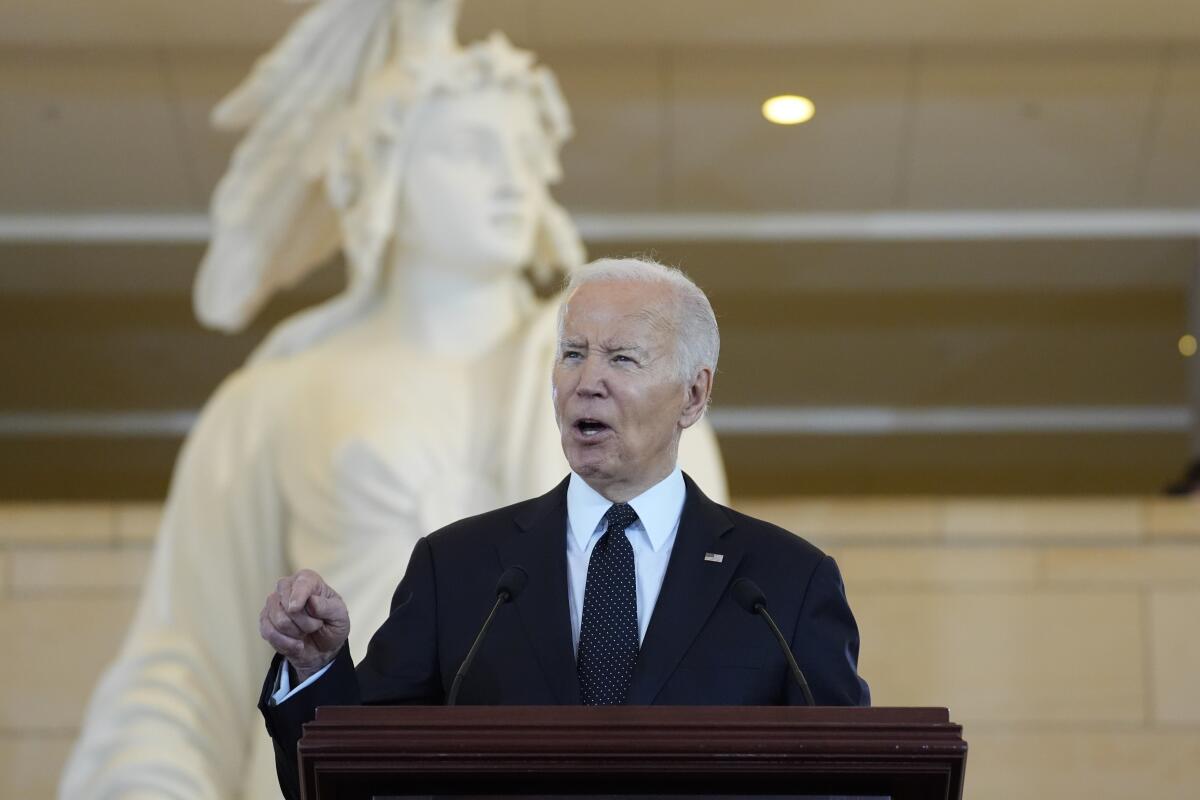Editorial: House antisemitism bill would stymie free speech and wouldn’t make students safer

- Share via
With campus protests against the war in Gaza as a backdrop, President Biden last week rightly denounced incidents in which “Jewish students [were] blocked, harassed, attacked while walking to class.” Such actions are appalling even if they involve a minority of protesters.
Meanwhile, the U.S. Department of Education released updated guidance for educational institutions about compliance with Title VI of the Civil Rights Act, which prohibits discrimination on the basis of race, color or national origin in programs receiving federal financial assistance, a statute the department interprets as protecting Jews, Muslims and Sikhs. The latest guidance includes a description of situations in which Jewish students are targeted — for example, a complaint that a dormitory room door was defaced with swastikas.
College presidents in the Vietnam era would have thanked their lucky stars to face the relatively low disruptions caused by student movements in 2024.
Biden’s remarks and the Education Department’s decision to issue updated guidance are appropriate responses to the concerns of Jewish students. Not appropriate — in fact, arguably unconstitutional — is a bill overwhelmingly approved by the House that would have the Education Department use an expansive definition of antisemitism that could chill political speech.
Although it received significant support from Democrats, the Antisemitism Awareness Act was brought to the floor by Speaker Mike Johnson (R-La.) and must be seen as part of election-year efforts by Republicans to portray Biden and the Democratic Party as soft on antisemitism.
Jewish collective trauma, like that of the Palestinians, is undeniable. One shouldn’t have to go to Treblinka to be reminded of this.
The problem with the Antisemitism Awareness Act is that it directs the Education Department to “take into consideration” the working definition of antisemitism promulgated by the International Holocaust Remembrance Alliance when determining whether there has been a Title VI violation. That definition offers examples of what everyone would regard as antisemitism. But it also gives as examples of antisemitism criticisms of Israel that, even if they are unfair, are protected speech.
For instance, the IHRA definition provides these examples as antisemitism: “denying the Jewish people their right to self-determination, e.g., by claiming that the existence of a State of Israel is a racist endeavor” and “applying double standards by requiring of [Israel] a behavior not expected or demanded of any other democratic nation.”
House Republicans’ antisemitism law is political theater at a moment when issues need real debate.
Israel is a member state of the United Nations and is not going away, nor should it. But some people, including college students, believe that Israel should be replaced by a secular state not tied to any religion or ethnicity. Expressing or debating this idea isn’t the same as spewing hatred against Jews.
Even more susceptible to abuse is the notion that it is antisemitic to subject Israel to double standards “by requiring of it a behavior not expected or demanded of any other democratic nation.” Does this mean that a student or professor is guilty of antisemitism for criticizing Israel but not other democratic nations?
Freedom of speech on college campuses is under enough pressure without the federal government adding to the problem by threatening to withdraw funding to punish people for expressing their political opinions.
Rep. Jerrold Nadler (D-N.Y.), describing himself as a “a deeply committed Zionist who firmly believes in Israel’s right to exist as a homeland for the Jewish people,” nevertheless opposed the legislation. Agreeing with the American Civil Liberties Union, Nadler warned that “if this legislation were to become law, colleges and universities that want to avoid Title VI investigations, or the potential loss of federal funding, could end up suppressing protected speech criticizing Israel or supporting Palestinians.” Moreover, he added, “it could result in students and faculty self-censoring their political speech.”
The Education Department has said that it considers the IHRA definition in some of its investigations in determining whether there is discriminatory intent. But it also has said that an antisemitic act “does not violate Title VI merely because . . . it involves an example of antisemitism contemplated by the IHRA.” In enforcing Title VI, the department tries to determine if there is pervasive conduct that creates a hostile learning environment.
Antisemitism is as old as time. In Los Angeles, prejudice against Jewish people took on new and more public forms in the 1920s and 1930s and beyond.
Some might argue that adopting the House bill wouldn’t matter because the Education Department already takes the IHRA definition into account. But both supporters and opponents of the Antisemitism Awareness Act think that it would make a difference. It would — but in a negative way. And enshrining the definition in federal law would make it harder for a future administration to decide that the definition isn’t useful.
Protecting all students from harassment and intimidation on the basis of their identity is a vital objective. But it can and must be accomplished without infringing on freedom of speech.
More to Read
A cure for the common opinion
Get thought-provoking perspectives with our weekly newsletter.
You may occasionally receive promotional content from the Los Angeles Times.















